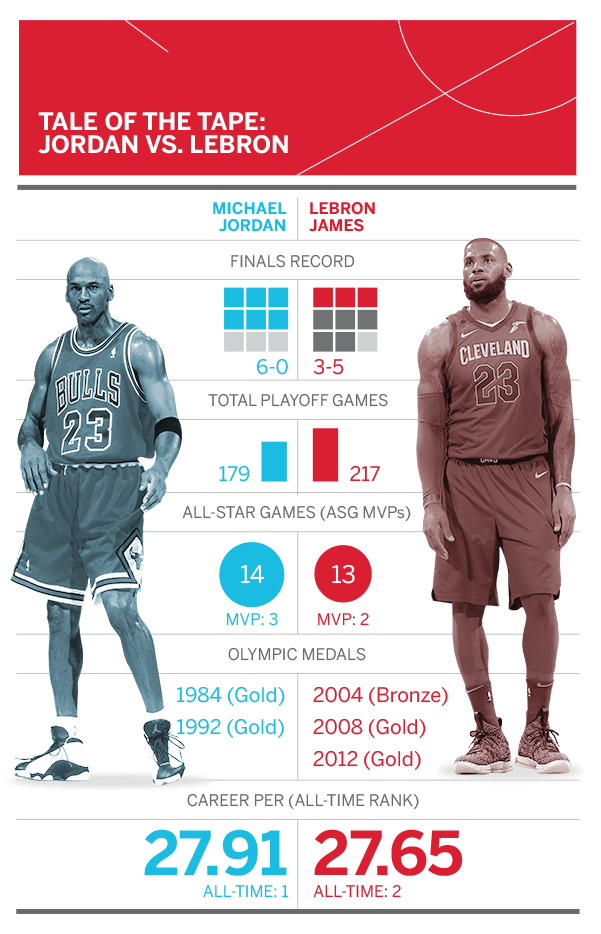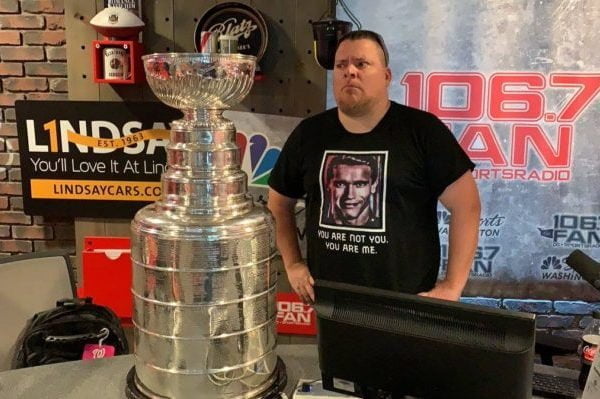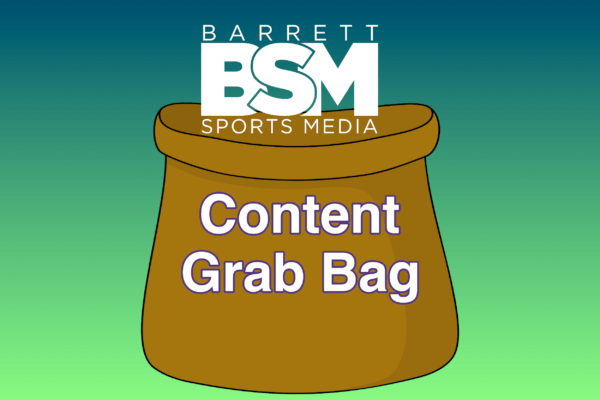It’s a unique and challenging time for sports radio hosts. Conducting entertaining sports radio while sporting events are paused indefinitely isn’t something many hosts or stations have experience with. But the average listener is equally impacted by COVID-19 in their own life, so the show must go on.
Many hosts are having to adjust, without being able to depend on last night’s game to drum up passion and create entertaining radio. But if we look at Howard Stern’s interview with Tom Brady as an example, sports fans don’t need an expert of last night’s game to be entertained.
Chad Dukes Vs. The World airs weekdays from 2 – 6:30pm in Washington, D.C. for Entercom’s 106.7 The Fan. Entercom hit a rough patch in recent weeks with two rounds of employee cuts, but Dukes remains focused on what he can control, creating great radio.

Chad has a background hosting on music stations, even working locally on Free FM affiliates in the post-Howard Stern era of terrestrial radio. He hosts afternoon drive for the top sports station in D.C., but Chad Dukes Vs. The World is rarely 100% sports focused. That’s made it easier to transition when forced to create content without last night’s game to discuss.
Brandon Contes: We’ll start with the idea of hosting a sports radio show without live sports. You have a radio background working for stations that weren’t sports focused. Does that give you an advantage when creating content right now?
Chad Dukes: Yes, guy talk or whatever you want to call it, is the format I came from and I feel like I’m adept at it. I try to keep the format as much as possible just because there’s so much content about coronavirus and I want to keep a sense of normalcy on my show. It’s about 50/50 or even 60/40 sports content to non-sports content on my show anyway.
BC: Has that percentage changed at all since live sports stopped?
CD: Because the NFL is so active and free agency has been so salacious with Tom Brady moving to the Buccaneers, we’ve been lucky. Even here in Washington, the Redskins have been doing all sorts of crazy stuff, so I’ve been able to talk about the NFL because it’s busy.
There’s a lot of lame sports talk content right now, where the uptight sports guys are like, ‘give me your Top 10 sports DVDs!’ and it just – [deep sigh] it feels childish to me. I’m trying to operate my show as I normally would, because I just think everyone else is being completely oversaturated with content.
BC: So are you saying you didn’t do a bracket?
CD: No. There’s 10 billion brackets out there. So, no [Laughs]. No brackets for us.
BC: I thought it was interesting once sports came to a stop, there was an adrenaline rush for a lot of hosts. It seemed like they needed a boost, I saw a lot of tweets, ‘this is what separates the great hosts, I’m always creative, I never just fill time, I always entertain.’ Did you get any sense of that mentality?
CD: No, a lot of that’s virtue signaling, especially on social media. I used to do radio with Chris Cooley and he would say “there’s guys who need to have their facemask grabbed or screamed at by linebackers and I’m not one of those guys.” Well I’m not one of those guys either.
I realize with broadcasting, it’s going to be more important because people are listening for different reasons and at different times. My policy is, this is a difficult time for everybody and people are losing their jobs. I don’t want to be the squeaky wheel. I’m trying to do this with as little bombast and virtue signaling as I possibly can throughout this process.
BC: What are some things you look at as filler radio? Some hosts will say call segments are filler or just saying the word ‘steroids’ is filler. Is there anything you try to avoid?
CD: Yea, who’s better, LeBron James or Michael Jordan? There’s too much of that in our business. It’s lazy. You can get people screaming about it any time.

I try to do stuff that everyone can contribute to. I don’t want to say it’s a low brow show, but I try to keep in mind not everyone’s an expert. A lot of people have families and other things going on in their lives. I try to do topics where if I’m going to involve the listeners, it’s something a majority of them can contribute to.
BC: I love radio, but it’s more formatted than the podcast space, which is one of the reasons podcasts grew on me. In radio, there’s a way a show needs to sound to make sure you get your commercials, get your sports updates and sports minutes in. Can the strict formatics and regimen take away from creativity?
CD: I have a lot of live reads during my show and I’m lucky to have those sponsors. But some of that stuff gets repetitive from time to time with commercials and updates and traffic – there’s a lot of crap that’s around. But I gotta be honest, I think it gives radio a leg up on podcasts and it’s why you see so many people still listening to radio, because it’s happening now.
I have a friend, JP Finlay who works for NBC Sports Washington and you’ll see him, ‘We’re going to drop an emergency podcast tonight about Kyle Allen being traded!’ Well I’m talking about it right now on the radio, taking callers, having reporters on that are covering it.
Radio will always be better than podcasts because it’s live as it’s happening, there’s interaction between the listeners and people. A podcast is a static thing that already happened, it’s a rerun. I like them, I do podcasts, but there’s not that interpersonal relationship that you get with live radio because it’s current.
BC: With that interpersonal relationship and without sports, you have an open slate of topics that you can discuss because you don’t need to be focused on what the Nationals did last night. So can bypassing sports make the show even more personal and build a stronger connection with listeners?
CD: I think so. The other day we had someone call in and say you’re not supposed to refrigerate butter. It turned into a 45-minute conversation about condiments and whether or not they should go in the fridge.
The biggest compliments I’m getting right now are people saying “I feel normal listening to your show, you’re not all doom and gloom, I feel like my life is a little bit normal because I turn on WJFK 106.7 The Fan and I’m hearing all my favorite shows do their shows.” I take a lot of pride in that.
BC: Does being in D.C. lead to political conversations on-air? Since you’re in the thick of it?
CD: Not for me. If you talk about politics on sports talk radio, you’re committing career suicide. People on either side don’t want it, I think they want sports. I didn’t do Colin Kaepernick, I didn’t do the take a knee stuff, I didn’t do any of it. Because I don’t want 49% of my listeners to be pissed off about my opinion on it, no matter what it may be. If you want to come find me in a bar, I’ll tell you how I feel about that stuff. I’ve always thought ratings are about getting as many people under your big top as you possibly can and that’s how I look at it, even though we’re right here in the belly of the beast.
BC: Has your segment time and amount of content you produce in an hour changed in recent weeks? Obviously it varies around the country, there are shows that do 33-minute hours and shows that do 50-minute hours, but as advertisers become harder to find, I imagine it will adjust, even in big markets.
CD: My live spot load has diminished slightly. But no, whatever it is they’re doing, PSAs or regular commercials, we’re still pretty lucky that a lot of our people stick with us. A lot of the people I work with are essential, so thus far it’s been a fairly traditional way of doing it.
We did something cool over the weekend. All the part-timers unfortunately aren’t able to get hours, but the salaried hosts joined together for mashup shows. I did a three-hour shift Saturday with Cakes from The Sports Junkies. It’s kind of fun to mix and match midday guys with morning guys.

BC: How do you like working with a PD like Chris Kinard?
CD: He’s the best, man. I’m lucky, I’ve known him since high school. My career took me away from here for a couple years and we figured out a way to get back. He really cares about people and is a tremendous radio mind. He listened and was influenced by a lot of the same shows I was, so he gets where I come from.
He puts up with me being unconventional because I couldn’t do my show in Detroit or Chicago, they wouldn’t put up with my show. He gets it, he gives me a lot of creative freedom and we don’t have many fights. He’s one of the best minds in radio and he just got a big promotion that is well deserved in the company. I think he’s going to be a general manager before he knows it and feel very lucky to have him be my boss for the last 12, 13 years or so.
BC: Do you know if you’re going to keep hosting with someone different on Saturday?
CD: I’m up for anything. I want to be pulling on the rope in the right direction and like I said, don’t want to be the squeaky wheel. So if I need to put some hours in for free, I don’t mind doing that.
I loved working with Cakes and The Junkies. They’re an institution here. They’ve been around for 23 years. They took over for Howard when he went to Sirius and never looked back. I interned for their radio show at 21 and I didn’t believe I could be on radio before that. I used to listen to Stern, I listened to Greaseman and Don and Mike and all these shows and said, well I can’t do that. But when I listened to The Junkies, they make it sound so effortless and I thought I could do it. Luckily, I was correct. Being able to do a show with a guy from the program that meant so much to me in my career, it’s really cool for me. It’s an honor and a lot of fun, I hope we’ll do more shows together.
BC: I want to check out The Junkies right now to hear them do it from home. You’re solo, even if you bring your producer in, you control when that happens. I would imagine having four or more people on one show would be really tough to do that from different locations.
CD: Sure, and they’re on TV. They’re simulcast on NBC Sports Washington and they’re from home and there’s four of them. I can’t imagine what it’s like to put all that together. Their producer, Drab, used to be my producer. He’s now the APD and really coming into his own doing all this in such an arduous process under all these constraints, but they’re pulling it off without a hitch. They’ve really stepped up. It’s been a learning experience for all of us.
BC: Is there concern because there’s already been a lot of changes? You’re working from home, you’re working on weekends because part-timers were cut. It’s only been two weeks since sports stopped and it could be two, three or even six months more. It’s going to continue to impact advertising dollars and such. Are you worried about the industry?
[This question was asked prior to Entercom laying off a significant number of full-time employees Apr. 2]
CD: Entercom wants to make this work. They’re a radio company, they understand radio and we’re lucky that they’ve been very communicative with us. We need advertisers, we need to sell commercials, I understand that, but I also can’t predict that.
I have a tendency – my brain works a lot when I don’t want it to and I found it helps to focus on what you can control. I can’t control any of this right now. What I can control is doing the best radio show I can. Showing up, being available for whatever they ask me to do and that’s all I’m trying to focus on right now.
BC: Are you someone that does a lot of show prep and planning?
CD: No, we have guests, I have four or five guys that I like to talk to and rotate. If there’s an A-topic, we’ll figure out how to revisit it two or three times during the show because the listeners turnover. I might be tired of talking about it, but Ronnie Rockville’s getting into his car to start his commute and wants to hear about Dwayne Haskins taking a selfie, even though I’ve been talking about it for the last 3.5 hours. I’d say the most prep I do goes into taking the biggest topic of the day and trying to address it in different ways throughout the course of the afternoon.
BC: You mentioned you’re a Stern fan, how was the Ian Rapoport scuffle when Howard played that a couple years ago?
CD: Oh man. It’s just unbelievable. I’ve been very lucky. Opie and Anthony, The Junkies, Ron and Fez, and all these iconic shows, I have good relationships with them. Mike O’Meara, I consider a close friend, he did 15-20 years with the Don and Mike Show, the biggest show in D.C. Stern’s been there my whole life and seemed bigger than life, like I’d never be able to interact with him. He’s generally not all that positive about other radio guys.
BC: Especially sports radio!
CD: And he literally said, ‘this is the type of sports talk radio I would listen to.’ And he said that about my show. I can’t think of a greater endorsement.
BC: Is there a specific bit you did on-air that stands out?
CD: The one I’m known for is the Redskins rant after the Monday Night Massacre, where I believe Mike Vick hung five touchdowns on the Redskins. I came in the next day, as a lifelong Redskins fan with only one year or so in sports talk here at that point. I lost it. I was screaming like a crazy person. Now I’m embarrassed by it, but not a week goes by that I don’t have a Redskins fan tell me they go back and listen to it on YouTube and say it’s the greatest rant of all time. I got booked everywhere, [Laughs] Questlove followed me on Twitter after he listened to it. It was my 15 minutes, even though it’s a little embarrassing.
BC: Radio’s been impacted right now, but you’re also a small business owner, which isn’t easy, how’s Commonwealth Dry Goods doing?
CD: It’s tough because they just locked Virginia down. My wife runs the day to day, she does a great job of that and we’re able to do online orders. The great thing is, I’m in D.C. doing radio and I’m from here, so I’ve built a following. People are being very generous and want to support the store. So far, we haven’t been impacted too much. We had to change the way we do business, but sales are fine. I appreciate you asking because owning a small business is a very unique thing to do.

BC: It’s also cool to be a small business owner because it’s something that resonates with listeners, especially now. Everyone that owns a small business is struggling and depending on each other for support. I think the fact that you’re involved with that helps further your connection with listeners.
CD: It does, it gives you a perspective when you’re supporting small businesses, just how much it really means to them. There’s a taco place called Tippy’s that I’d go to back when I was three years old, my dad used to take me. They messaged me the other day that they’re hurting and need customers and I was able to rally people to get there. I’m not getting paid for that, but it makes you feel good to have an impact on a struggling local business that’s been around forever.
Brandon Contes is a former reporter for BSM, now working for Awful Announcing. You can find him on Twitter @BrandonContes or reach him by email at Brandon.Contes@gmail.com.








